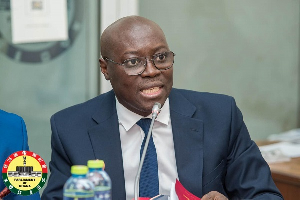 Dr. Cassiel Ato Forson, Minister of Finance
Dr. Cassiel Ato Forson, Minister of Finance
The World Bank is cautioning that a premature return to the capital market would send the wrong signals to investors.
The World Bank Country Director for Ghana, Liberia and Sierra Leone, Robert R. Taliercio, made this known at the Bank’s launch of the Ghana Public Finance Review this week – where he warned against complacency as he urged authorities to sustain fiscal consolidation efforts.
These comments come against the backdrop of recent unsustainable debt levels, resulting in the nation’s credit ratings plummeting, making it impossible to borrow from the international market.
The government has consequently pivoted to short-term instruments, particularly Treasury bills, to finance its business, raising rates and squeezing out the private sector.
Consequently, the World Bank stressed a need for fiscal discipline, structural reforms, and the completion of the current adjustment programme, which aims to reduce the debt-to-GDP ratio to acceptable levels in the medium term.
“Not fully completing the adjustment programme – reducing debt to GDP to 55 percent by 2028 – could jeopardise the credibility of policy reforms and the fundamentals for long-term growth,” Taliercio added.
The report, titled ‘Building the Foundations for a Resilient and Equitable Fiscal Policy’, aims to inform Ghana’s fiscal consolidation efforts as the country strives to rebound from the 2022 macroeconomic crisis, the World Bank said.
It highlighted a lack of fiscal discipline as a key driver of its economic crisis in 2022, citing weak budgetary institutions, rising fiscal liabilities and declining revenue collection.
The findings show that weak expenditure controls and an overreliance on external commercial debt led to unsustainable debt accumulation, which was exacerbated by a decline in tax revenue. Revenues collected as a share of GDP fell from 15.7 percent in 2017 to 13 percent in 2021, with income tax and VAT revenue dropping despite contrasting trends in peer countries.
The costly financial sector clean-up and persistent losses in the energy sector further strained public finances. The report identified tax administration inefficiencies and widespread exemptions as critical revenue gaps.
The review also identifies liabilities from state-owned enterprises (SOEs), especially in the energy and cocoa sectors, as a major fiscal risk.
Watch the latest edition of BizTech below:
Click here to follow the GhanaWeb Business WhatsApp channel
